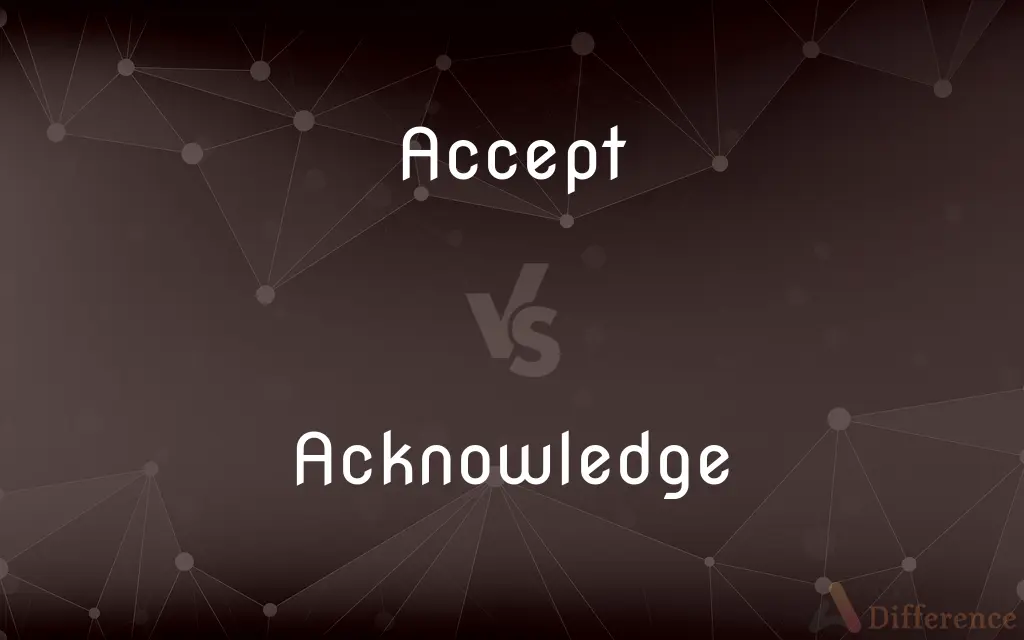Accept vs. Acknowledge — What's the Difference?
Edited by Tayyaba Rehman — By Urooj Arif — Updated on April 5, 2024
Accept means to receive willingly something offered, whereas acknowledge involves recognizing the truth or existence of something without necessarily agreeing with it.

Difference Between Accept and Acknowledge
Table of Contents
ADVERTISEMENT
Key Differences
Acceptance usually indicates a positive reception towards an offer, idea, or situation, suggesting agreement or approval. It often implies embracing or consenting to what is presented. For instance, accepting a job offer means you agree to the terms and will take the position. On the other hand, acknowledging something doesn't imply agreement or approval but merely the recognition of its existence or truth. This could range from acknowledging a fact, an emotion, or someone's effort without endorsing or accepting it.
While acceptance is often associated with tangible or conceptual offers, such as accepting a gift or a proposal, it implies a level of endorsement and willingness to integrate that offer into one's life. Conversely, acknowledgment can be more passive, acknowledging someone's point in a debate doesn't necessarily mean you agree with them, but rather, you recognize their perspective as valid.
In the context of social interactions, acceptance plays a crucial role in building relationships and community bonds. It's about affirming others and being open to new experiences or viewpoints. Whereas, acknowledgment in social contexts might simply mean recognizing someone's presence or contributions without the deeper implication of embracing or agreeing with them.
Acceptance often requires a deeper level of commitment or change, such as accepting a new role requires adapting to new responsibilities. In contrast, acknowledgment does not require a change or commitment to a new state of affairs; it's more about recognizing the current state of things or the validity of others' feelings or viewpoints.
In legal or formal settings, acceptance and acknowledgment can have specific implications. Accepting a contract means you are legally bound by its terms, indicating a full commitment to its conditions. Acknowledging a document, however, often refers to recognizing its existence or validity, which is a prerequisite for certain legal processes but does not bind one to its terms in the same way.
ADVERTISEMENT
Comparison Chart
Definition
To receive something willingly or agree to it.
To recognize the truth or existence of something.
Implication
Implies agreement and willingness to integrate.
Does not imply agreement, just recognition.
Usage
Often used in contexts of offers, gifts, or proposals.
Used in recognizing facts, emotions, or efforts.
Commitment
Requires a level of commitment or change.
No change or commitment to a new state is required.
Social Context
Builds relationships through affirmation.
Recognizes presence or contributions without deeper implications.
Compare with Definitions
Accept
To agree to take something.
I accept your offer to help with the project.
Acknowledge
To accept or admit the existence or truth of something.
The company acknowledged the need for a change in management.
Accept
To consent to receive or undertake something offered.
He accepted the package from the delivery person.
Acknowledge
To express gratitude for or appreciation of.
He acknowledged their support in his acceptance speech.
Accept
To admit or agree that something is true.
She finally accepted that she was wrong.
Acknowledge
To notify the sender upon the receipt of something.
We will acknowledge receipt of your application within seven days.
Accept
To regard as proper, normal, or inevitable.
They accepted the delay due to the bad weather as inevitable.
Acknowledge
To recognize the existence or truth of something.
He acknowledged the complexity of the problem.
Accept
To welcome someone into a group.
The team accepted the new member with open arms.
Acknowledge
To show that one has noticed or recognized someone, for example, by moving one's head or smiling.
She acknowledged my greeting with a nod.
Accept
To answer affirmatively
Accept an invitation.
Acknowledge
Accept or admit the existence or truth of
The plight of the refugees was acknowledged by the authorities
The government acknowledged that the tax was unfair
‘That's true,’ she acknowledged
Accept
To agree to take (a duty or responsibility).
Acknowledge
Recognize the importance or quality of
The hotel is widely acknowledged as one of Cornwall's finest
The art world has begun to acknowledge his genius
Accept
To receive (something offered), especially with gladness or approval
Accepted a glass of water.
Accepted their contract.
Acknowledge
Show that one has noticed or recognized (someone) by making a gesture or greeting
She refused to acknowledge my presence
Accept
To admit to a group, organization, or place
Accepted me as a new member of the club.
Acknowledge
To admit the existence or truth of
The doctors acknowledged that the treatment had not been successful.
Accept
To regard as proper, usual, or right
Such customs are widely accepted.
Acknowledge
To express recognition of; make notice of
"When he saw me acknowledge him, he smiled as if we were dear friends" (Angela Patrinos).
Accept
To regard as true; believe in
Scientists have accepted the new theory.
Acknowledge
To express gratitude or appreciation for or to
Acknowledged the contributions of the volunteers.
Acknowledged her editor in the preface to the book.
Accept
To understand as having a specific meaning.
Acknowledge
To report the receipt of (something) to the sender or giver
Acknowledge a letter.
Accept
To endure resignedly or patiently
Accept one's fate.
Acknowledge
(Law) To accept or certify as legally binding
Acknowledge a deed of ownership.
Accept
To be able to hold (something applied or inserted)
This wood will not accept oil paints.
Acknowledge
(transitive) To admit the knowledge of; to recognize as a fact or truth; to declare one's belief in
To acknowledge the being of a god
Accept
To receive officially
Accept the committee's report.
Acknowledge
(transitive) To own or recognize in a particular quality, character or relationship; to admit the claims or authority of; to give recognition to.
Accept
To consent to pay, as by a signed agreement.
Acknowledge
(transitive) To be grateful of (e.g. a benefit or a favour)
To acknowledge a favor
Accept
To take payment in the form of
A store that does not accept checks.
Acknowledge
(transitive) To report (the receipt of a message to its sender).
This is to acknowledge your kind invitation to participate in the upcoming debate.
Accept
(Medicine) To receive (a transplanted organ or tissue) without immunological rejection.
Acknowledge
(transitive) To own as genuine or valid; to assent to (a legal instrument) to give it validity; to avow or admit in legal form.
Accept
To receive something, especially with favor. Often used with of.
Acknowledge
To own or admit the knowledge of; to recognize as a fact or truth; to declare one's belief in; as, to acknowledge the being of a God.
I acknowledge my transgressions.
For ends generally acknowledged to be good.
Accept
(transitive) To receive, especially with a consent, with favour, or with approval.
Acknowledge
To own or recognize in a particular character or relationship; to admit the claims or authority of; to give recognition to.
In all thy ways acknowledge Him.
By my soul, I'll ne'er acknowledge thee.
Accept
(transitive) To admit to a place or a group.
The Boy Scouts were going to accept him as a member.
Acknowledge
To own with gratitude or as a benefit or an obligation; as, to acknowledge a favor, the receipt of a letter.
They his gifts acknowledged none.
Accept
(transitive) To regard as proper, usual, true, or to believe in.
I accept the notion that Christ lived.
Acknowledge
To own as genuine; to assent to, as a legal instrument, to give it validity; to avow or admit in legal form; as, to acknowledge a deed.
Accept
(transitive) To receive as adequate or satisfactory.
Acknowledge
Declare to be true or admit the existence or reality or truth of;
He admitted his errors
She acknowledged that she might have forgotten
Accept
(transitive) To receive or admit to; to agree to; to assent to; to submit to.
I accept your proposal, amendment, or excuse.
Acknowledge
Report the receipt of;
The program committee acknowledged the submission of the authors of the paper
Accept
(transitive) To endure patiently.
I accept my punishment.
Acknowledge
Express recognition of the presence or existence of, or acquaintance with;
He never acknowledges his colleagues when they run into him in the hallway
She acknowledged his complement with a smile
It is important to acknowledge the work of others in one's own writing
Accept
(transitive) To acknowledge patiently without opposition or resistance.
We need to accept the fact that restaurants are closed due to COVID-19 and that no amount of wishing or screaming will make them reopen any sooner.
Acknowledge
Express obligation, thanks, or gratitude for;
We must acknowledge the kindness she showed towards us
Accept
To agree to pay.
Acknowledge
Accept as legally binding and valid;
Acknowledge the deed
Accept
(transitive) To receive officially.
To accept the report of a committee
Acknowledge
Accept (someone) to be what is claimed or accept his power and authority;
The Crown Prince was acknowledged as the true heir to the throne
We do not recognize your gods
Accept
(intransitive) To receive something willingly.
Accept
(obsolete) Accepted.
Accept
To receive with a consenting mind (something offered); as, to accept a gift; - often followed by of.
If you accept them, then their worth is great.
To accept of ransom for my son.
She accepted of a treat.
Accept
To receive with favor; to approve.
The Lord accept thy burnt sacrifice.
Peradventure he will accept of me.
Accept
To receive or admit and agree to; to assent to; as, I accept your proposal, amendment, or excuse.
Accept
To take by the mind; to understand; as, How are these words to be accepted?
Accept
To receive as obligatory and promise to pay; as, to accept a bill of exchange.
Accept
In a deliberate body, to receive in acquittance of a duty imposed; as, to accept the report of a committee. [This makes it the property of the body, and the question is then on its adoption.]
Accept
Accepted.
Accept
Consider or hold as true;
I cannot accept the dogma of this church
Accept an argument
Accept
Receive willingly something given or offered;
The only girl who would have him was the miller's daughter
I won't have this dog in my house!
Please accept my present
Accept
Give an affirmative reply to; respond favorably to;
I cannot accept your invitation
I go for this resolution
Accept
React favorably to; consider right and proper;
People did not accept atonal music at that time
We accept the idea of universal health care
Accept
Admit into a group or community;
Accept students for graduate study
We'll have to vote on whether or not to admit a new member
Accept
Take on as one's own the expenses or debts of another person;
I'll accept the charges
She agreed to bear the responsibility
Accept
Tolerate or accommodate oneself to;
I shall have to accept these unpleasant working conditions
I swallowed the insult
She has learned to live with her husband's little idiosyncracies
Accept
Be designed to hold or take;
This surface will not take the dye
Accept
Of a deliberative body: receive (a report) officially, as from a committee
Accept
Make use of or accept for some purpose;
Take a risk
Take an opportunity
Common Curiosities
What does it mean to accept something?
To accept something means to agree to receive it or take it on willingly.
Can you accept something without acknowledging it?
Generally, acceptance implies a form of acknowledgment, but it's focused on a positive reception and agreement, making acknowledgment a prerequisite in most contexts.
What does acknowledge mean?
To acknowledge means to recognize the truth or existence of something, often without agreeing or approving.
How do acceptance and acknowledgment differ in legal contexts?
In legal contexts, acceptance often means agreeing to the terms of a contract, while acknowledgment refers to recognizing the validity of a document or fact without implying agreement to its terms.
What role does acceptance play in social relationships?
Acceptance is crucial for building and maintaining strong social relationships by affirming and embracing others.
How can acknowledgment impact communication?
Acknowledgment can enhance communication by validating the presence or contributions of others, fostering a respectful dialogue.
Is it possible to acknowledge someone's achievements without endorsing their methods?
Yes, one can acknowledge someone's achievements without endorsing the methods they used to attain them.
How does culture influence the process of acceptance and acknowledgment?
Cultural norms and values can significantly influence how acceptance and acknowledgment are expressed and perceived in different contexts.
Is acknowledgment the same as agreement?
No, acknowledgment is recognizing something's existence or truth, which doesn't necessarily imply agreement with it.
Why is it important to acknowledge feelings?
Acknowledging feelings is important for emotional validation and helps in building empathy and understanding in relationships.
Can acknowledgment lead to acceptance?
While acknowledgment can be a step towards acceptance, it does not automatically lead to it, as acceptance involves a deeper level of agreement and integration.
Can you give an example of when you might acknowledge something without accepting it?
You might acknowledge someone's opinion in a discussion as valid without accepting it as your own belief.
Can acceptance be conditional?
Yes, acceptance can be conditional, depending on whether certain terms or conditions are met.
How does acknowledgment affect workplace dynamics?
Acknowledgment in the workplace can boost morale and recognition, positively affecting productivity and satisfaction.
What is the importance of accepting feedback?
Accepting feedback is important for personal and professional growth, as it offers perspectives that can lead to improvement.
Share Your Discovery

Previous Comparison
Bugs vs. Money
Next Comparison
Omnipresent vs. UbiquitousAuthor Spotlight
Written by
Urooj ArifUrooj is a skilled content writer at Ask Difference, known for her exceptional ability to simplify complex topics into engaging and informative content. With a passion for research and a flair for clear, concise writing, she consistently delivers articles that resonate with our diverse audience.
Edited by
Tayyaba RehmanTayyaba Rehman is a distinguished writer, currently serving as a primary contributor to askdifference.com. As a researcher in semantics and etymology, Tayyaba's passion for the complexity of languages and their distinctions has found a perfect home on the platform. Tayyaba delves into the intricacies of language, distinguishing between commonly confused words and phrases, thereby providing clarity for readers worldwide.















































